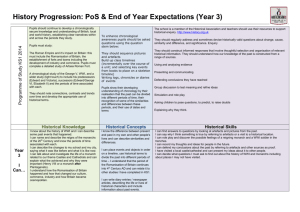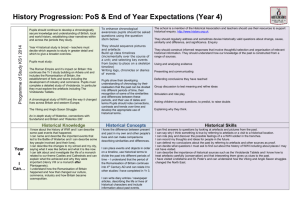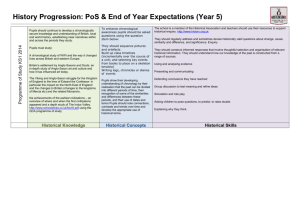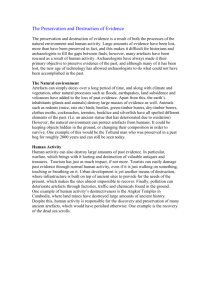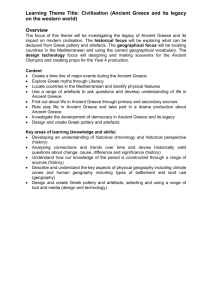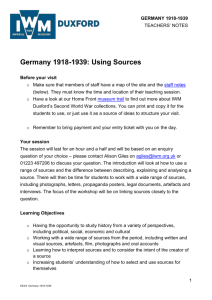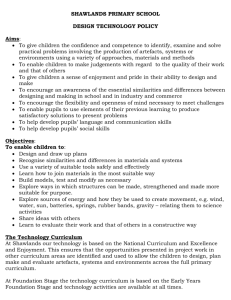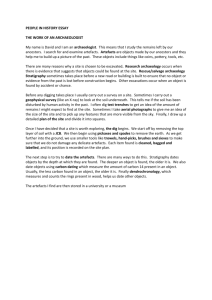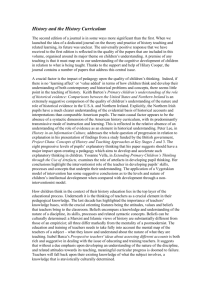Yr 6 History
advertisement
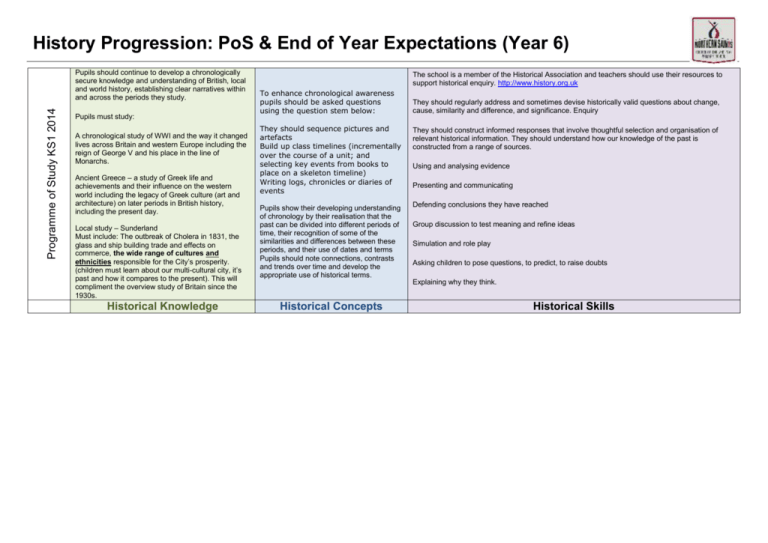
History Progression: PoS & End of Year Expectations (Year 6) Programme of Study KS1 2014 Pupils should continue to develop a chronologically secure knowledge and understanding of British, local and world history, establishing clear narratives within and across the periods they study. Pupils must study: A chronological study of WWI and the way it changed lives across Britain and western Europe including the reign of George V and his place in the line of Monarchs. Ancient Greece – a study of Greek life and achievements and their influence on the western world including the legacy of Greek culture (art and architecture) on later periods in British history, including the present day. Local study – Sunderland Must include: The outbreak of Cholera in 1831, the glass and ship building trade and effects on commerce, the wide range of cultures and ethnicities responsible for the City’s prosperity. (children must learn about our multi-cultural city, it’s past and how it compares to the present). This will compliment the overview study of Britain since the 1930s. Historical Knowledge The school is a member of the Historical Association and teachers should use their resources to support historical enquiry. http://www.history.org.uk To enhance chronological awareness pupils should be asked questions using the question stem below: They should regularly address and sometimes devise historically valid questions about change, cause, similarity and difference, and significance. Enquiry They should sequence pictures and artefacts Build up class timelines (incrementally over the course of a unit; and selecting key events from books to place on a skeleton timeline) Writing logs, chronicles or diaries of events They should construct informed responses that involve thoughtful selection and organisation of relevant historical information. They should understand how our knowledge of the past is constructed from a range of sources. Pupils show their developing understanding of chronology by their realisation that the past can be divided into different periods of time, their recognition of some of the similarities and differences between these periods, and their use of dates and terms Pupils should note connections, contrasts and trends over time and develop the appropriate use of historical terms. Defending conclusions they have reached Using and analysing evidence Presenting and communicating Group discussion to test meaning and refine ideas Simulation and role play Asking children to pose questions, to predict, to raise doubts Explaining why they think. Historical Concepts Historical Skills History Progression: PoS & End of Year Expectations (Year 6) I know about the history of WWI and I can articulate some past events that happened. I can name and describe the important events and historical perspectives of Ancient Greece and can evaluate their influence on the modern world and modern Britain. Year 6 I can talk about and investigate the lives of people in Ancient Greece (and I understand how they influenced art, culture and laws). I Can… I can describe the changes to my school and my city, saying what it was like before and what it is like now including Victorian Sunderland and it’s multi-cultural heritage. I can link my geographical work on Benin to the History of Benin and describe the main features I can identify differences and similarities between present and past locally and further afield. I can describe the causes and affects of: industrial change, influence of civilisations on current culture, why wars happen. I can place the development of my City, Ancient Greece, WWI on separate timelines and can use historical terms to divide the past into different periods of time. I can find answers to questions by looking at artefacts and pictures from the past. I can say why I think something is true by referring to artefacts or a visit to a historical location. I can role play / imagine / discover the possible feelings of a WWI soldier in the trenches by using a range of historical enquiry techniques (and I can say what the techniques are e.g. analysing documents, comparing accounts). I can record my thoughts and ideas for people in the future. I can defend my conclusions about the past by referring to artefacts and other sources as proof. I can decide what questions I must ask to find out about the history of WWI including about places I may not have visited. I can describe the importance of historical sources such as the collection of Ancient Greek materials in the artefacts and I know how to treat artefacts carefully (conservation) and that interpreting them gives us clues to the past. I know that views about the past differ and I can explain why there are differing views. I can describe many periods of history in broad terms relating a number of features. I can write diary entries / newspaper articles, describing the life or lives of historical characters and include information about past events. § We use the “I can statements” in bold to assess whether the children are at the expected level by the end of Year 6. We will report to parents / carers each half-term saying whether or not your child is on track to ‘achieve’ or ‘exceed’ the expected level. The list below contains common stems that can be used to devise key questions that focus on specific areas of historical knowledge, skills and understanding: Question stem Link to key concepts and key skills Question stem Link to key concepts and key skills 'What was it like ...?' Enquiry 'What were the effects ...?' Causation 'What was it like in/for ...?' Features of societies 'Why do we remember ...?' Causation History Progression: PoS & End of Year Expectations (Year 6) 'Why was ... So important to the ... people?' Features of societies 'Does ...tell us the truth about ...?' Interpretations 'What were the differences ...?' Change 'Why do people disagree about ...?' Interpretations 'How did life change...?' Change 'Was ... a hero/ villain as portrayed?' Interpretations
